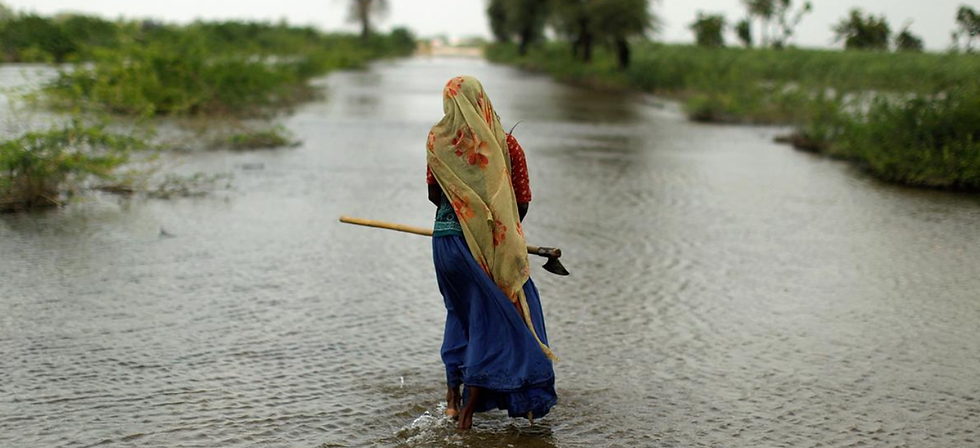The Economic Burden of Flood Disasters in Pakistan
- Wania Ali
- Sep 5, 2025
- 3 min read

Pakistan is responsible for less than 1% of the global greenhouse gas emissions, according to the European Union, yet the Global Climate Risk Index ranks it as the eighth most vulnerable nation to the climate crisis.
This vulnerability has revealed itself with devastating clarity in recent years, with global warming intensifying monsoon rains in Pakistan. According to rescue officials, nearly half a million people have been displaced from the flash floods triggered by heavy downpours and cloudbursts.

Despite ongoing relief efforts, the Punjab Disaster Management Authority has reported 835 fatalities nationwide. With excess water in many areas, the World Health Organization has also warned of a rise in diseases such as dengue and malaria, leaving more of the population in great danger. All in all, lives remain at stake and the scale of damage is immense.
With recurring climate catastrophes, the future of the country appears clouded, as each disaster brings new economic and social challenges. During the devastating floods of 2022, the country witnessed $14.8 billion in damage to property and land and a loss of $15.2 billion in the country’s gross domestic product (GDP).

Since Pakistan is mainly an agricultural country, the first hit always falls on its farmlands and crops, leaving farmers vulnerable and food security at risk. A 2022 report on floods by the Finance Division of the Government of Pakistan also highlighted that, “women in particular, have suffered notable losses to their livelihoods, particularly associated with agriculture and livestock, with attendant negative impacts on their economic empowerment and wellbeing.”
Moreover, when rice, wheat, and cotton fields are destroyed, the damage doesn’t stop at the farm level, it spills over into the wider economy. Exports take a major hit, with the textile sector suffering the most from the shortage of cotton.

Supply chain disruptions are also a major factor affecting Pakistan’s GDP. As roads, bridges and other infrastructure are destroyed, economic activity slows to a halt. The cost of rebuilding this damaged infrastructure adds another heavy burden, forcing the government to divert scarce resources away from long-term development projects.
The recurring floods in Pakistan can’t only be seen as a regional tragedy, since climate change is affecting communities, economies and ecosystems globally. From the terrifying wildfires in Los Angeles that destroyed homes and displaced thousands, to record-breaking floods in South Asia, no part of the world is immune to the climate crisis. These disasters do not just impact each region globally but carry global economic consequences, putting the world’s GDP at risk.

According to a report cited by The Guardian, “The global economy could face 50% loss in gross domestic product (GDP) between 2070 and 2090 from the catastrophic shocks of climate change unless immediate action by political leaders is taken to decarbonise and restore nature.”
As climate change creates ripple effects across the globe, it is imperative that leaders worldwide come together to take immediate, coordinated action for decarbonising economies, restoring ecosystems and building resilience to protect both people and their livelihoods. While governments play a critical role in providing relief, the responsibility to support affected communities does not rest on them alone. It is a shared responsibility that falls on every individual. By adopting sustainable practices both at home and at the workplace, we can collectively play a part in mitigating the climate crisis to some extent.

In response to the recent floods, Daftarkhwan, in collaboration with Rizq, is supporting displaced families through fundraisers. By contributing to these efforts or helping organizations like Akhuwat, Al-Khidmat Foundation and Islamic Relief Pakistan, everyone can take part in making a meaningful impact during these challenging times and uphold their individual responsibility.


As a nature explorer, I believe peace and stability are as essential for nations as they are for ecosystems. Just like nature thrives through balance and harmony, our region too needs understanding and dialogue to flourish. The Istanbul talks offer hope — a chance to restore equilibrium and let cooperation grow where conflict once stood.
As a nature explorer, this situation in Pakistan feels like witnessing a fragile ecosystem pushed beyond its limits. Despite contributing little to global emissions, Pakistan bears the harshest consequences of climate change—floods, displacement, and disease spreading like invasive species after a storm. The land that once nurtured life now struggles to survive under rising waters. Just as nature adapts slowly to balance, humanity must act quickly to restore harmony—through sustainable practices, global cooperation, and empathy for those most affected. Every submerged field, every displaced farmer, is a reminder that the planet’s climate is one interconnected system demanding collective care.
This is a powerful and eye-opening piece. 🌿 The devastating impact of floods in Pakistan truly highlights how climate change affects vulnerable nations the most, despite their minimal contribution to global emissions. At Nature Explore, we believe raising awareness and taking collective action for sustainability is the need of the hour. Together, we can protect both people and the planet. 🌍💚
Great article — very insightful on how flood disasters are imposing a heavy economic burden on Pakistan. In times like these, small businesses, especially those dealing in pet grooming supplies Pakistan, also face serious disruptions. Broken supply chains, damage to inventory, and loss of customer access all hurt these niche providers as much as larger industries. Flood resilience and disaster planning at local levels are essential to help sectors of all sizes recover.